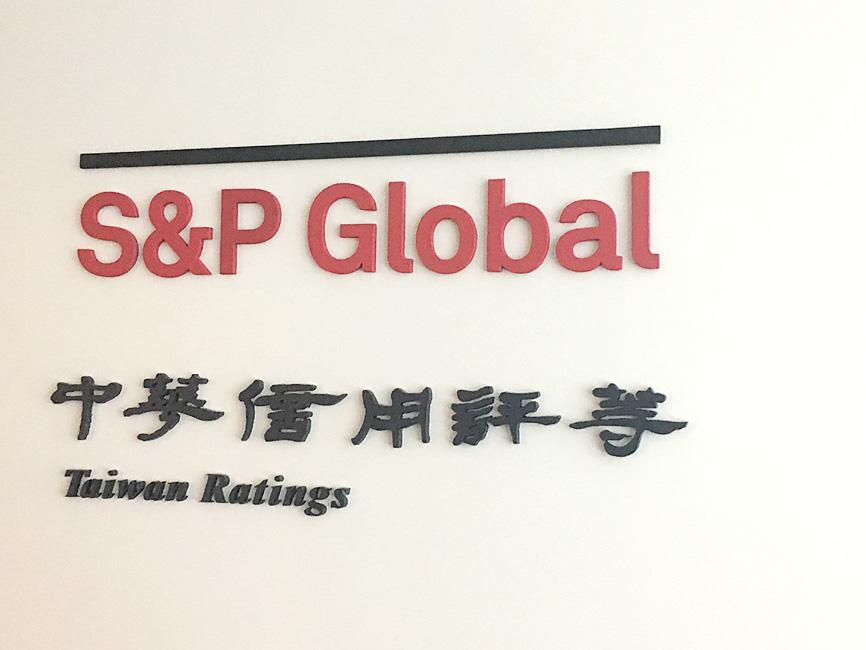S&P Global Ratings has raised Taiwan’s GDP growth forecast from 1 percent to 1.64 percent for this year, while trimming the pace from 3 percent to 2.9 percent for next year, amid the benefits of a stay-at-home economy and optimism that COVID-19 vaccines would reduce downside risks.
The rollout of vaccination programs against the COVID-19 outbreak would support a stable outlook for Taiwan’s economy this year and next year, despite global demand being ravaged by the pandemic, corporate credit analyst Raymond Hsu (許智清) at Taiwan Ratings Corp (中華信評), the local arm of S&P, told a news conference in Taipei yesterday.
“Growth risk is now neutral as multiple vaccine successes increase recovery upside,” Hsu said.

Photo: Clare Cheng, Taipei Times
Taiwan has emerged from the pandemic unscathed, thanks to its effective handling of the outbreak, and an unexpected boom in demand for remote working and schooling devices, Hsu said.
Strong electronics exports and low material costs have bolstered the outlook for local firms, with the earnings of top corporations beating the agency’s expectations, he said.
Downside risks, while retreating, remain, while ongoing virus containment measures and growing debt worldwide could derail the post-pandemic recovery, Taiwan Ratings said.
High inventories and receding demand from the low-contact economy are substantial risks, particularly for the technology sector, Hsu said.
Other risks include oversupply from aggressive investments in China, technology shifts and rising production costs for capacity diversification, he said.
COVID-19 pains could persist for chemical companies, with their business outlook staying negative, Hsu said, adding that a recovery could be pushed back to 2022 and beyond for oil refining despite improving oil prices.
Massive capacity expansions in China are unfavorable to recovery and Taiwan’s exclusion from regional trade bodies would add long-term pressure on chemical companies, with the bulk of their capacity in Taiwan, he said.
Domestic auto sales are stable, helped by domestic demand, while the global auto market looks much weaker, he said.
The pandemic would continue to hamper air travel and container carriers have not yet come out of related risks, Hsu said.
The banking sector might see moderate loan growth of 4.5 percent next year, supported by a projected 3 percent GDP growth, Taiwan Ratings financial analyst Andy Chang (張書評) said.
However, low interest rates and market volatility could continue to squeeze the sector’s profitability, with its pretax return on assets expected to drop to a decade-low of 0.4 percent, from 0.49 percent this year, Chang said.
Bad debts would rise next year after relief and subsidy programs expire, he said.

GROWING OWINGS: While Luxembourg and China swapped the top three spots, the US continued to be the largest exposure for Taiwan for the 41st consecutive quarter The US remained the largest debtor nation to Taiwan’s banking sector for the 41st consecutive quarter at the end of September, after local banks’ exposure to the US market rose more than 2 percent from three months earlier, the central bank said. Exposure to the US increased to US$198.896 billion, up US$4.026 billion, or 2.07 percent, from US$194.87 billion in the previous quarter, data released by the central bank showed on Friday. Of the increase, about US$1.4 billion came from banks’ investments in securitized products and interbank loans in the US, while another US$2.6 billion stemmed from trust assets, including mutual funds,

AI TALENT: No financial details were released about the deal, in which top Groq executives, including its CEO, would join Nvidia to help advance the technology Nvidia Corp has agreed to a licensing deal with artificial intelligence (AI) start-up Groq, furthering its investments in companies connected to the AI boom and gaining the right to add a new type of technology to its products. The world’s largest publicly traded company has paid for the right to use Groq’s technology and is to integrate its chip design into future products. Some of the start-up’s executives are leaving to join Nvidia to help with that effort, the companies said. Groq would continue as an independent company with a new chief executive, it said on Wednesday in a post on its Web

JOINT EFFORTS: MediaTek would partner with Denso to develop custom chips to support the car-part specialist company’s driver-assist systems in an expanding market MediaTek Inc (聯發科), the world’s largest mobile phone chip designer, yesterday said it is working closely with Japan’s Denso Corp to build a custom automotive system-on-chip (SoC) solution tailored for advanced driver-assistance systems and cockpit systems, adding another customer to its new application-specific IC (ASIC) business. This effort merges Denso’s automotive-grade safety expertise and deep vehicle integration with MediaTek’s technologies cultivated through the development of Media- Tek’s Dimensity AX, leveraging efficient, high-performance SoCs and artificial intelligence (AI) capabilities to offer a scalable, production-ready platform for next-generation driver assistance, the company said in a statement yesterday. “Through this collaboration, we are bringing two

Even as the US is embarked on a bitter rivalry with China over the deployment of artificial intelligence (AI), Chinese technology is quietly making inroads into the US market. Despite considerable geopolitical tensions, Chinese open-source AI models are winning over a growing number of programmers and companies in the US. These are different from the closed generative AI models that have become household names — ChatGPT-maker OpenAI or Google’s Gemini — whose inner workings are fiercely protected. In contrast, “open” models offered by many Chinese rivals, from Alibaba (阿里巴巴) to DeepSeek (深度求索), allow programmers to customize parts of the software to suit their